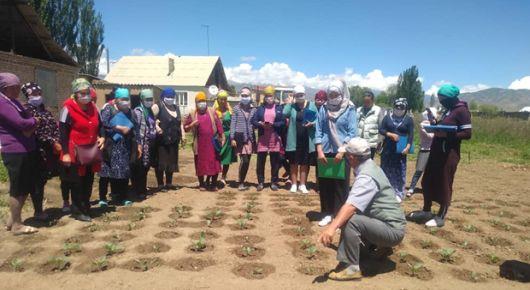Quality seeds bring climate resilience to Kyrgyz agriculture

A new initiative has started in Kyrgyzstan by FAO and the Ministry of Agriculture, Food Industry and Melioration, that contributes to the spread of climate change adaptation processes in agriculture and food systems by improving the resilience of seed systems and the quality of climate-tolerant seed varieties.
“In the realities of the coronavirus pandemic, we might overlook other global challenges. Today, climate change remains one of the biggest threats that impacts many different sectors, including agriculture, which is the key contributor for ensuring overall food security,” said Adnan Quereshi, FAO Representative in the Kyrgyz Republic.
Agriculture in Kyrgyzstan, like in many other developing countries, is facing several challenges, especially in the seed sector. The most urgent problems include the lack of national seed breeds and the dependence on imports, outdated or missing national legislation related to the national seed system, and the lack of national capacities to breed new or maintain and multiply local varieties. Farmers don’t have access to and knowledge about high quality seeds, and the awareness on the importance of plant genetic resources management is low.
“We can see that some crop seeds are often imported at a high price and are not always available to small farmers, especially now, when the pandemic hit,” said Jigitaly Jumaliev, Head of the Ministry Department of agriculture, seed production and organic agriculture. “The project will the seed production system and create conditions for the promotion of quality seed of selected climate change resistant crops through the improvement of the legislative framework, as well as through practical training on the reproduction of some seeds, technology selection, and recovery of varieties.”
According to Tania Santivanez, FAO agriculture officer, the Organization will make every effort to contribute to enhance climate change adaptation processes in the country. Tools might include improved strategies, support to research institutes, and the introduction of tolerant seed varieties and sustainable agricultural practices to improve and sustain food security, nutrition, and incomes through increased production and productivity in rural areas and those being adversely affected by climate change impact.
The project is in line with government policies and strategies and will be integrated into public development actions to ensure its sustainability beyond the project duration.
Another outcome of the project is to allow Kyrgyzstan crop sector increasing independence and resilience through improving the institutional and legal frameworks of seed systems and identification, and promoting varieties with different tolerance levels addressing a broad scope of resilience issues.
29 July 2020, Bishkek, Kyrgyzstan
